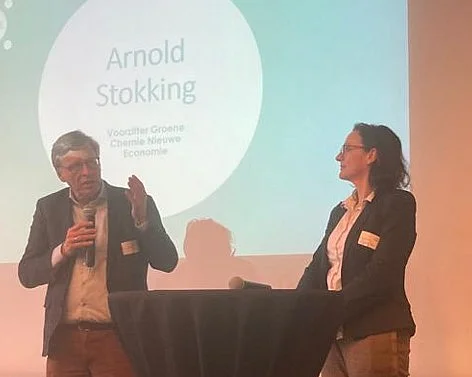Reflection on the 'No Time to Waste' Meeting
18-04-2023
Utilizing new waste streams for recycling does not come without challenges. Entrepreneurs are confronted with unclear laws and regulations, finding it impossible to obtain prior certainty from the government regarding the legal viability of their plans. Green Chemistry, the New Economy, and Invest-NL have asked Ecomatters to map out how the main obstacles to recycling can be overcome. On April 17, the findings were presented to over 100 participants during the event No Time to Waste.

Recyclers face various barriers when defining reuse options for new waste streams. Naturally, it is important that the new applications do not pose any health risks. “But it is often unclear whether you fully meet the legal requirements,” says report compiler Marco Mense from EcoMatters: “The entrepreneur is responsible for determining when a waste stream can be reused as a raw material. The government can provide a legal opinion on whether you are rightly claiming the end-of-waste status, but it does not provide you with legal certainties. Therefore, it may happen that the environmental agency objects to the use of a waste stream in a product.”
Another bottleneck is international alignment. Mense: “Just because a waste stream can be converted for a product in the Netherlands does not mean that it can be easily exported. Each EU member state has its own rules, and it can therefore be that you have everything well organized in the Netherlands but are still stopped by customs.”
Mense argued that you need to have a number of things in order before you proceed to claim the end-of-waste status: “Know your raw material, know your process, know your product, know your market, and know the safety of your product. If you have your file in order regarding these aspects, you can get very far.” Danny Vancoppenolle from Bureau Veritas demonstrated how to clarify matters with your own certification scheme: “Focus on assurance, transparency, and traceability by making the LCA, mass balance, carbon footprint, and safety issues transparent.”
Björn Koopmans, program manager at GCNE, sees much potential in creating own certification schemes: “Even though it has no legal status, it is still a good way to show what aspects you have considered. I can imagine that such schemes will ultimately serve as a framework for governmental assessments. This would make the requirements regarding the end-of-waste status much clearer.”
Additionally, Koopmans advocates for more coordinated support from the government: “Many entrepreneurs are asking for a national point of contact instead of the current decentralized approach. I expect that if we can establish an intergovernmental pool of experts, we can make significant progress. But again, we need a central assessment framework.”
Koopmans also calls for international agreements: “In the short term, we should not expect harmonization at the EU level, but the EU does offer space in so-called regulatory sandboxes: this provides room for innovations more than is currently legally possible. Moreover, it might be interesting to explore what is possible within the Benelux framework.”
The findings, summarized in a report, were handed over during the meeting by Arnold Stokking and Rinke Zonneveld (Invest-NL) to Jeannette Baljeu (Deputy South Holland), Jacqueline Vaessen (Ambassador ChemistryNL), and Hagar Ligtvoet (Ministry of Infrastructure and Water Management). Zonneveld emphasized that the report is not an endpoint: “We will go deeper into the subject with Rebel Group. Right now, we are missing far too many opportunities to make the circular transition succeed. We will continue to focus on that.”
The report and presentations can be read and downloaded here.
Also read the article from Change Inc on this theme.





